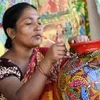Sustainability Agenda: How Ashwidea is curating solutions for corporates seeking to invest in CSR initiatives
Ashwin Subramanian, Founder and CEO, Ashwidea, speaks to Social Story about how companies need to sensitise employees on sustainability and collaborate with each other to achieve greater impact.
In 2013, Ashwin Subramanian’s wife Preethy Iyer gifted him a blog for his birthday. The idea was for him to document how they practised sustainability, a subject Ashwin feels very strongly about, in their daily lives. The blog, Ashwidea, was a portmanteau of his name Ashwin+Idea.
Today, nearly a decade later, Bengaluru-based Ashwidea has evolved into a much larger company that is consulting across a broad spectrum including offering corporates advice on how to run their CSR programmes, fund-raising for nonprofits, and working on the ground with them across the country, in areas such as education, health, water, environmental livelihoods.

Ashwin Subramanian, Founder and CEO, Ashwidea
Ashwidea Founder and CEO Ashwin, who holds a degree in chemical engineering from Punjab University, and an MBA from Symbiosis, was working for a large corporate space when he decided to move to Bengaluru to follow his passion for sustainability and the environment.
After several freelance projects, he was approached by several nonprofits, who wanted help with reaching out to sources of funding. A three-year project with an NGO called Wildlife Trust of India on mangrove conservation in Kerala laid the foundation for his company.
Speaking to Social Story, Ashwin said, “We started as a blog on sustainability at home, essentially whatever we were doing at home from a sustainability point of view. When I decided to start something of my own, I thought okay let me keep the same domain name because it kind of falls into a similar domain of work.”
He says with his background in the consulting space, especially in sustainability and renewable environment, he realised after speaking to several nonprofits that they did not have the skills for that. “This was in early 2017. Of course, things are a lot better now and things have become more professional. but back then I realised that was a big gap,” he says.
CSR as a Service
Ashwidea started working with a couple of nonprofits, and gradually built a larger pool. “One aspect of our work is fundraising, the other is engaging with volunteers on different kinds of projects as they are called in CSR parlance. This includes the activities they are running, how to manage them better, or providing services like assessments for those kinds of projects. We also work with corporates who are trying to figure out what they want to do from their CSR perspective and what they can do with their CSR social impact programmes and how they want to define them.”
Ashwidea’s two key areas of focus are CSR as a Service and CSR Finder.
“In the early days, when we would get requests, finding a match was a complex process. Today, through CSR Finder, we match corporates with about 20 non-profits we work with across the country on a regular basis, when they have any requirements,” he says.
Ashwin says that this streamlines the process for donors, especially corporates, where CSR is still in its fledgling stage and is handled by people who have other responsibilities as well. “They often have a very short span of time to get all the information and put it across to their Board to approve as a CSR activity. We have created a format where people can get whatever relevant information they need, without having to go through a 20-page proposal.”
He gives the example of a project Ashwidea completed with a Bengaluru-based IT company Microland Limited. “In mid- 2019, we worked with Microland, who wanted to engage with a certain number of schools that needed support on a regular basis. We shortlisted four schools where there was a requirement for washrooms for both boys and girls. The project not only involved renovating and reconstructing new washrooms in these locations, we also ensured that there were enough cleaning supplies and that the washrooms were cleaned regularly,” he says.

Ashwidea helped IT firm Microland identify four schools where there was a requirement for washrooms for both boys and girls.
Sensitisation about sustainability
Ashwidea also engages with companies to sensitise them about the larger picture of sustainability. “We have been helping companies become more sustainable by reducing their carbon footprint or managing waste better. We have also been looking at how they can engage their employees,” he says.
Ashwin feels that at many companies, sustainability is a very top-driven exercise. “Companies may talk about being carbon-neutral but one can see paper cups strewn everywhere. “The average employee might say, ‘Why do I care, or What does it mean to me?’ Employee behaviour is a very tough thing to change overnight, or it takes a lot of commitment from an organisation to change.”
As a well-known name on the city’s quizzing circuit, Ashwin says they have built engagement programmes for employees on sustainability, using quizzes as people seemed to enjoy them. “I blend the quizzes to make the programmes fun, and that gets people to listen.”
Ashwin says in the future, more impact can be achieved if companies and people collaborate. “Right now, we don’t see too much cross-company collaboration. I feel that it kind of boils down to who will get what credit. That becomes a challenge. I hope that we shed that insecurity and we are open to collaborate.”
Edited by Teja Lele


![[Sustainability Agenda] How The Habitats Trust is trying to change the approach to conservation in India](https://images.yourstory.com/cs/5/f5a7f3304b1211e9b6645b8ae897d03e/Imagecnz9-1626266357870.jpg?fm=png&auto=format&h=100&w=100&crop=entropy&fit=crop)





